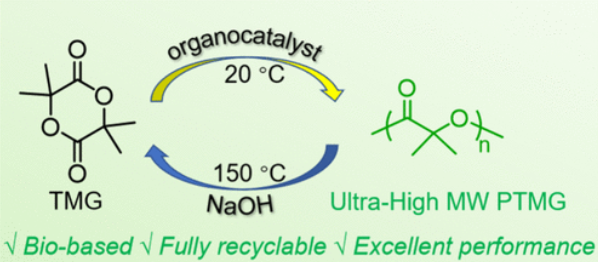An Introduction of Ultrahigh-Molecular-Weight Poly(tetramethyl glycolide) (PTMG): Mechanically Strong and Completely Recyclable
By Mufaddal Shakir
8/26/20251 min read
An Introduction of Ultrahigh-Molecular-Weight Poly(tetramethyl glycolide) (PTMG): Mechanically Strong and Completely Recyclable
Bio-based polymers are essential for attaining a sustainable circular plastic economy. Poly(l-lactic acid) (PLLA) provides a sustainable alternative to synthetic polymers, but its high gas permeability and moderate strength limit its applications. Poly(tetramethyl glycolide) (PTMG) shows promise as a sustainable polymer to PLLA but has inadequate tensile strength due to its low molecular weight produced by current uncontrolled anionic ring-opening polymerization methods. In order to combat this, researchers at Dalian University of Technology, China, have developed a completely recyclable and high-strength Ultrahigh-Molecular-Weight PTMG polymer.
About PTMG
Polytetramethylene glycol (PTMG), also known as polytetrahydrofuran (PTHF), is a linear polyether polymer widely used as a soft, flexible segment in polyurethane elastomers, thermoplastic elastomers, and copolyesters. Due to its exceptional elasticity, low glass transition temperature, and great flexibility, PTMG is highly desired in applications including industrial belts, spandex fibers, and elastomeric films that demand resilience under dynamic stress.


Graphical abstract showing synthesis of ultrahigh-molecular-weight PTMG (Source: ACS)
Synthesis and results of ultrahigh-molecular-weight PTMG
